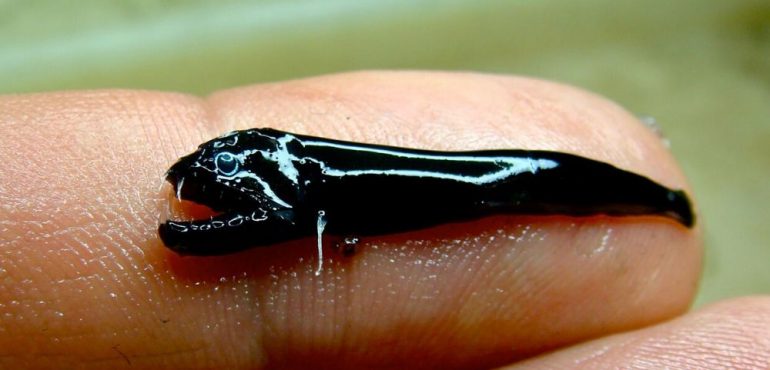Not only did an Australian government research team discover a cluster of 50 million-year-old volcanoes — an amazing find by itself — it discovered a new scary-looking fish species that features terrifying jaws and teeth, relative to their size.
The bizarre scale-less blackfish that was found was about the size of a fingertip, and had fangs, and a tail with a potential sting, according to CSIRO News and the Daily Mail.
Also discovered was what the Mail called a “nightmare-inducing chauliodontidae” with a massive set of teeth and an eel-like idiacanthidae, though it was unclear whether these were new subspecies.


The discoveries were made by scientists from the Commonwealth Scientific and Industrial Research Organization (CSIRO) aboard Australia’s new research vessel Investigator. CSIRO is Australia’s national science agency.
Marine biologist Iain Suthers of the University of New South Wales told CSIRO News that the team was amazed to discover an eddy off Sydney that was a hotspot for lobster larvae and other juvenile fish, including the new scale-less blackfish. The discovery was said to turn the previous understanding of juvenile commercial fish species on its head.
“We had thought fish only developed in coastal estuaries, and that once larvae were swept out to sea that was the end of them,” Suthers told CSIRO News. “But in fact, these eddies are nursery grounds for commercial fisheries along the east coast of Australia.”

CSIRO News focused more of its attention on the discovery of four extinct volcanoes found 125 miles offshore east of Sydney under three miles of ocean. The cluster is 12 miles long and nearly four miles wide with the highest point reaching 2,300 feet off the ocean floor.
The researchers were searching for the nursery grounds of larval lobsters when it came across the volcano cluster, which geologist Richard Arculus of Australian National University said has no real chance to erupt again.
“This is the first time these volcanoes have been seen,” Arculus told AAP. “It proves yet again that we know more about the topography of Mars than we do the sea bed in our own backyard.”
Source: GrindTV, Full Article


